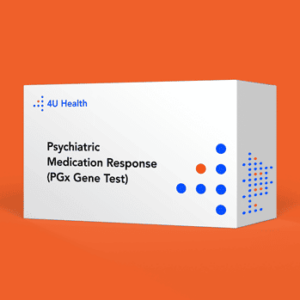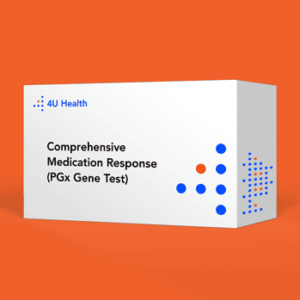
These medicines help many people, but finding the right drug and dosage can take a long time using the typical protocol of trial and error prescribing. With this methodology, patients try different options over an extended period of time to find the right balance of benefits and unwanted side effects. This process can be frustrating, unpleasant, and take a long time to produce desired results. Side effects of antidepressants include: drowsiness/fatigue, nausea, weight gain, constipation, dizziness, decreased libido, sexual dysfunction and more. Reducing the risks of these potential side effects helps patients continue treatment long enough to reap the beneficial aspects of antidepressants.
Fortunately, there’s an alternative to this “throwing darts at a dartboard” process. 4U Health’s Psychiatric Medication Response Test is a cutting edge pharmacogenomic (PGx) DNA test that analyzes 9 specific genes in your body known to impact the usefulness of 125+ mental health focused medications. The report will help your doctor select drugs and dosages based on your unique genetic profile.
The drugs are scored in three categories:
- Green: Standard Precautions
- Yellow: Use With Caution
- Red: Consider Alternatives
You will also learn how you metabolize each medicine:
- Poor metabolizer: Reduced or no enzyme activity, which could lead to higher drug concentrations in the body and an increased risk of side effects.
- Intermediate metabolizer: Reduced enzyme activity, potentially leading to increased drug concentrations and a higher risk of side effects compared to normal metabolizers.
- Normal (extensive) metabolizer: Typical enzyme activity and a standard drug response.
- Rapid metabolizer: Increased enzyme activity, which could result in lower drug concentrations and potentially reduced drug efficacy.
- Ultrarapid metabolizer: Significantly increased enzyme activity, leading to very low drug concentrations and a high risk of treatment failure.
Antidepressant Use Among Adults: United States, 2015-2018
https://www.cdc.gov/nchs/products/databriefs/db377.htm
Trial-and-Error Versus Personalized Treatment in Depression: The Power of Pharmacogenomics
https://www.heraldopenaccess.us/openaccess/trial-and-error-versus-personalized-treatment-in-depression-the-power-of-pharmacogenomics
FDA: Table of Pharmacogenetic Associations
https://www.fda.gov/medical-devices/precision-medicine/table-pharmacogenetic-associations

